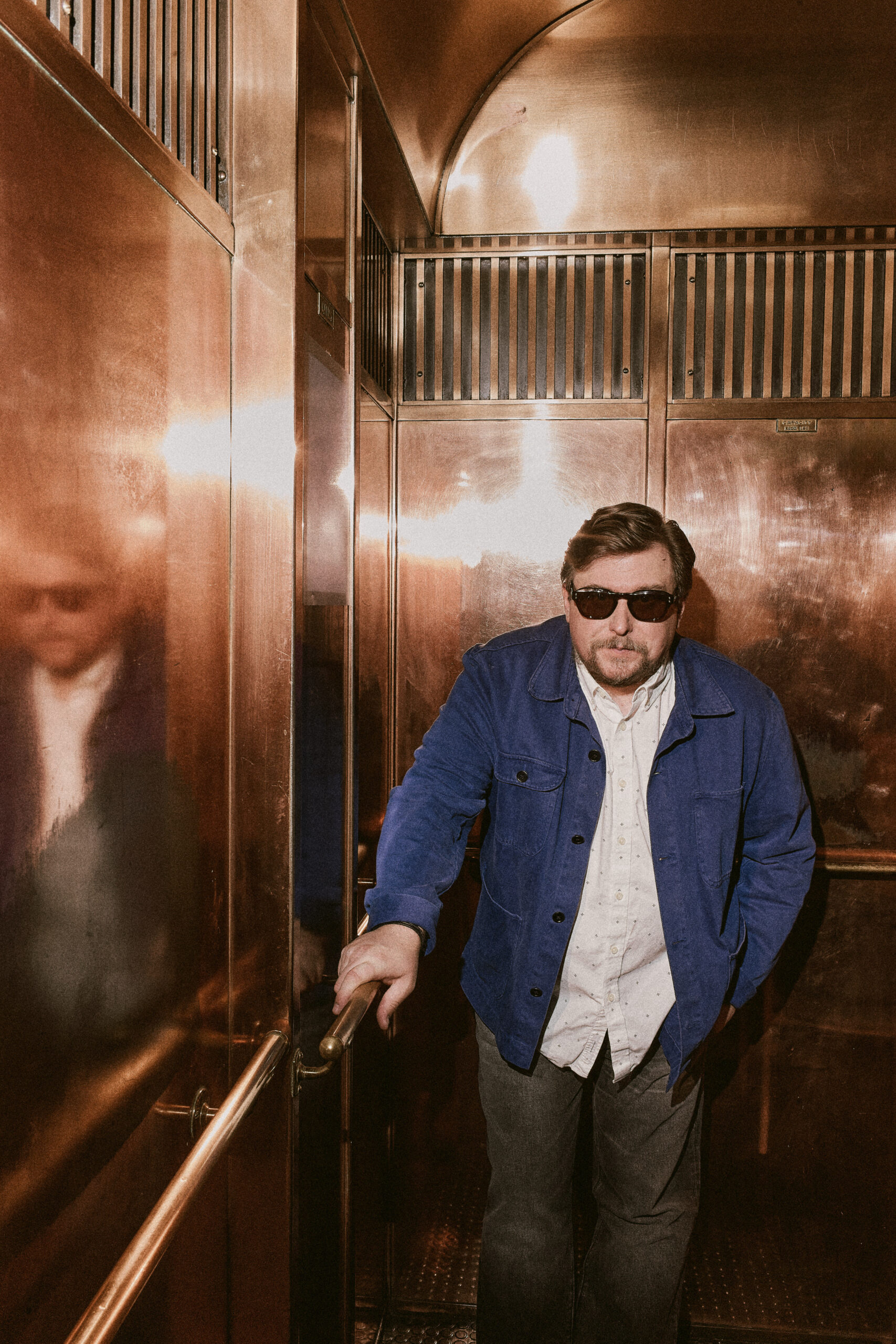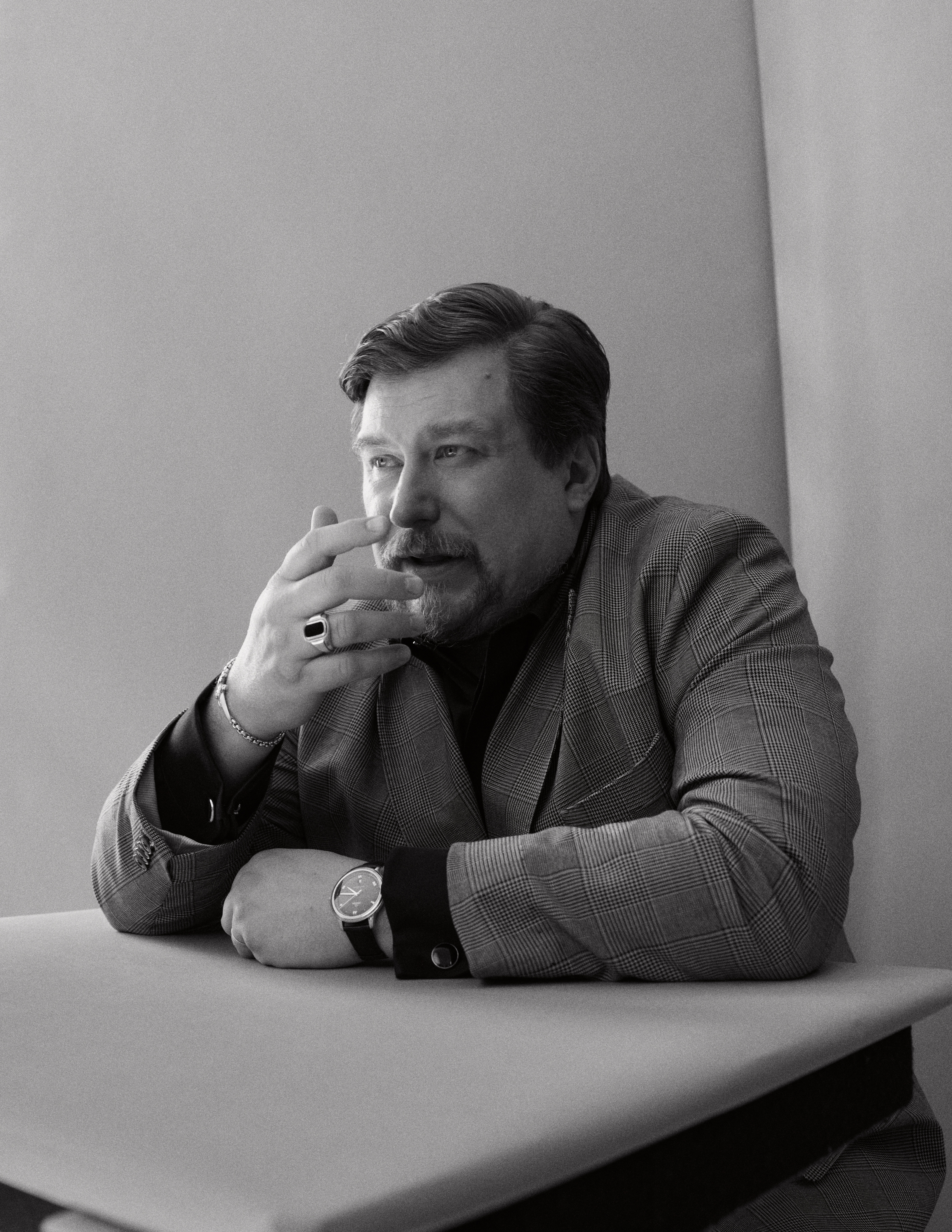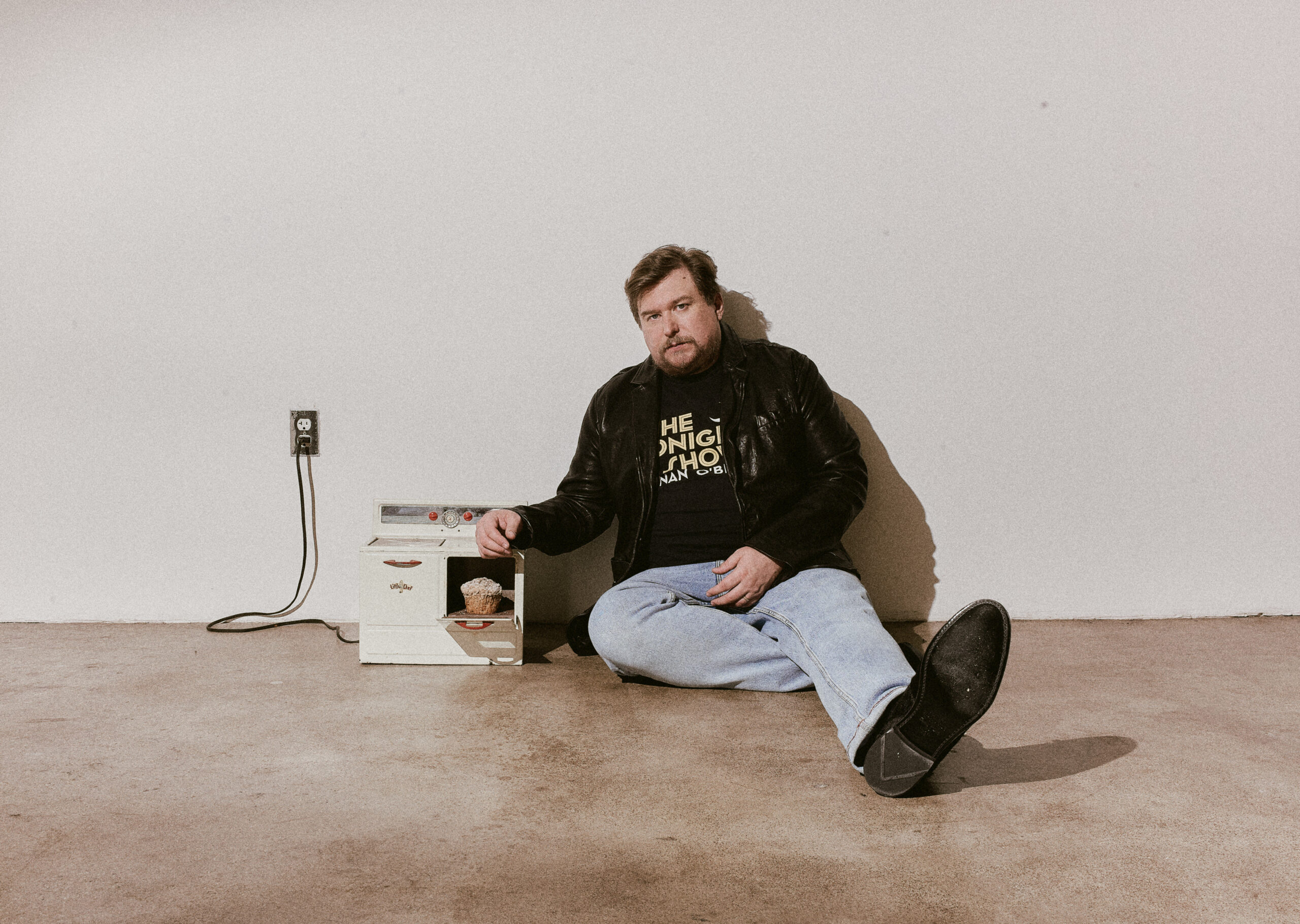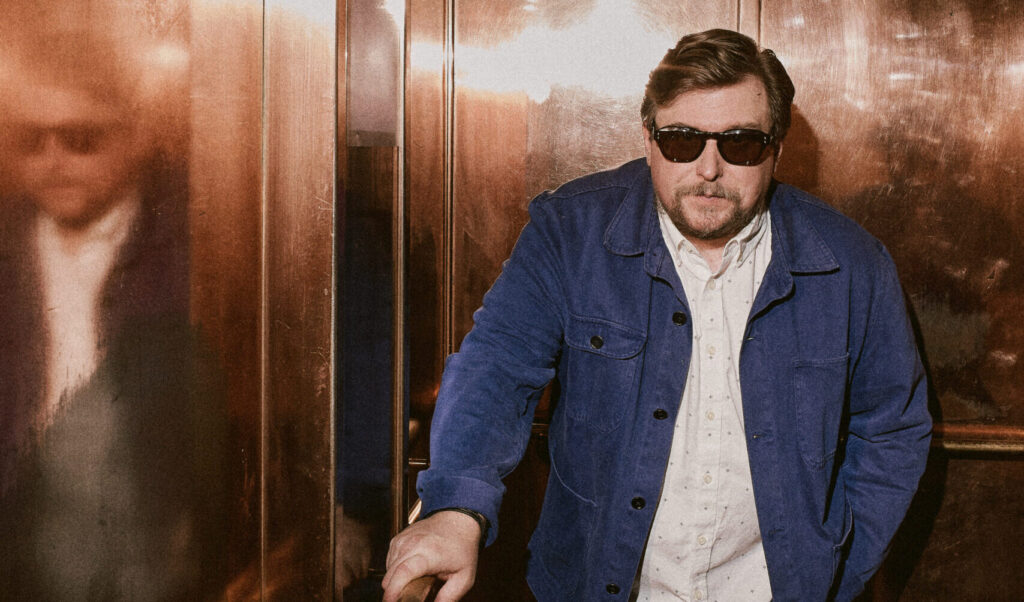
Michael Chernus, photographed by Emilio Madrid.
Since he first started acting in school plays in Lakewood, Ohio, Michael Chernus has been fascinated by supporting roles, the kinds of eccentric, outlandish personalities often brought to life by character actors. When he auditioned for a school production of Thornton Wilder’s Our Town, he asked to play Dr. Gibbs, the local physician. “I’ve always been drawn to like, not that guy, but that guy, over there,” he explains. “What’s he doing?” It’s a niche that the 48-year-old actor has carved out for himself quite successfully, having wracked up standout performances across film and television, in Severance, A Complete Unknown, and Orange is the New Black. But that all changes this month when he steps into the limelight as the prolific serial killer John Wayne Gacy, who raped, tortured, and murder at least 33 young men in the 1970s. For Devil in Disguise, the brand-new miniseries streaming now on Peacock, Chernus pushed himself to extremes to embody Gacy without necessarily humanizing him. “There was one day where I came back to my room, I took a shower, and I just started crying because the weight of it just came tumbling down,” he told his good friend and fellow Juilliard alum Adam Driver earlier this month. “He was a true psychopath. It was just unlike anything I’d ever played before.” Below, he and Driver discuss his months of preparation and research, plus fatherhood, stagework, and the “mindfuck” of playing a monster.
———
MICHAEL CHERNUS: Yo.
ADAM DRIVER: Chernus, man. Where are you?
CHERNUS: I’m at my house in northern Westchester. Thanks for doing this.
DRIVER: Yeah, of course. I’m fucking thrilled. I was watching [Devil in Disguise: John Wayne Gacy] last night and I had read this article in The Times about this guy who had just confessed to killing his parents at a local TV station. So I watched that, then I watched your show, and then I didn’t sleep very well.
CHERNUS: [Laughs] Yeah, that’s not a recipe for good rest.
DRIVER: [Laughs] Maybe I should start with how we know each other. I had always heard about you. Right when I graduated [from The Julliard School], I had heard of Chernus. The first play I think I’d seen you in was The Aliens at Rattlestick [Playwrights Theater].
CHERNUS: Yeah, Annie Baker’s play.
DRIVER: Which you were fucking great in. I loved you immediately.
CHERNUS: Wow. Thanks, man.
DRIVER: I can’t remember the first time we met, but you had done AITAF [Arts in the Armed Forces], that nonprofit where you performed for the military. Anytime we reached out, you were always game. Then I saw you recently in Well, I’ll Let You Go at The Space at Irondale, which has similar parallels to this, but on the opposite side of the spectrum.
CHERNUS: Truly, yeah. That character was someone that people thought was a good guy and actually was a good guy. [Laughs] As opposed to John Gacy, who made everyone think he was the friendly neighbor and then he was a pure monster.
DRIVER: Right, right. But man, I always love you as an actor. Your physicality is so fucking great, even in small things. I remember in Captain Phillips my eye always goes to you. What’s so great about your acting is that you’re someone who invites people in. You can tell, even in this, you’re a very generous scene partner with everybody that you’re acting with and with the audience as well.
CHERNUS: That’s the best compliment in the world. It means so much coming from you because I feel the same way about you. We went to the same schools, we were part of the same mafia, and even though we weren’t there at the same time, there’s a lot of the same ideology. Something I remember from school is just them encouraging you to always share your performance. You have to let the audience in, whether the audience is a camera or a couple hundred seats in a theater.
DRIVER: Yeah. How long did you know that you were going to do this? I know you guys shot in Toronto. I think we texted at one point.
CHERNUS: I maybe had like five months to work on it. I had a meeting in March of ’24 with the showrunner [Patrick Macmanus], and what was supposed to be a half-hour conversation turned into a two-hour Zoom meeting. My agent was very smart when they approached me. She said, “We got to find out what they’re doing with this because there’s a million different ways you could tell this story.” And she was totally right. The way we approached it was that there’s no actual onscreen murder. We didn’t want it to be salacious or glorify Gacy in any way. And there are these little flashbacks in every episode of his victims before they ever crossed paths with Gacy. Patrick said to me on this call, “I hope you’re okay with not being in every scene, because a lot of big actors would be annoyed that we have these short stories in every episode where you’re not going to be in any of them.” But in a way, it’s scarier, sort of like the first Jaws. We don’t see the shark very much until the end. Let him be a mystery until he isn’t.
DRIVER: Right, right, right. So did you guys talk about playing against the twirly mustache of it all?
CHERNUS: Yeah. Look, to be honest, when I watched the whole thing, there were a couple moments of it where I’m like, “Eugh!” And what I fought for was, “Let’s just do as many fucking takes as possible.” And Patrick would be like, “Now do a mustache twirly one in case we need it.” And even though I had a strong personal take on who this guy was and how I wanted to play him, there are just so many different ways you can play a scene. So I just tried to give as many options as possible.
DRIVER: Can you break down your prep a little bit? How religious did you feel like you needed to be?
CHERNUS: I’ve played a couple real guys, but this one was different, obviously. I felt a great amount of responsibility—not to him, because he can go rot in hell—but to the victims and the victims’ families and just telling the story right. I did a crazy amount of research. I watched him a lot and I read all of the books, even the bad ones. I went to Chicago, hung out at a bar that he used to hang out at and drove by where his old house was. They didn’t really want us talking to any real people who were family members or detectives. But I went for it, and eventually I was so deep in the research that our showrunner had to say, “Hey, knock it off. We’re not doing a documentary. This is based on the story, but there are fictionalized parts.” So I had to be pulled away from the research. But I was always going back to it. There’s more audio recordings of him than video. He was only ever interviewed on video that is public after his arrest and conviction. But there are some audio recordings from when he was arrested that I feel like were closer to the version of him when he was killing, before he really knew that he was going to spend the rest of his life in jail and was going to be executed. So I listened to him a lot on set. I had a recording on my iPhone that I would listen to before we would shoot.
DRIVER: So when you do all that research and then you actually are shooting it, what are the weekends like? [Laughs]
CHERNUS: It’s a good question. I brought my whole family, including our dog. We rented a townhouse and we moved to Toronto. My daughter was one-and-a-half at the time, so we brought all of her toys. We made it home. We stayed in Toronto for the holidays and our family came to us. And so every time I walked in the door, I had to drop it no matter what I had done at work that day, no matter what horrible scene we had shot. And some mornings, I come in the door at 5:00 AM from work and she’s just getting up and I have to get on the floor and play toys with her or whatever. And that saved my life, I think. Because if I was in some shitty corporate condo in Downtown Toronto by myself for six months, I would’ve been self-destructive.
DRIVER: So how long was the shoot overall?
CHERNUS: About six months.
DRIVER: Wow.
CHERNUS: I was there September 3rd to March 3rd.

DRIVER: Prep is about having control, and sometimes it applies and sometimes it doesn’t because it permeates things when you don’t even intend for it to. It’s like how you move to a different country and you adjust to the time or if you exercise first thing in the morning—your body just naturally starts to think about it.
CHERNUS: With this one, it was about trying to load up as subconsciously as possible. And I agree, I think everything is part of the prep, not just the research, but what you’re listening to music-wise, what you’re eating, how you’re sleeping. Everything goes into it. And at home there would be times where I would say something and it would come out kind of in a Midwest accent, or I’d say something that sounded a little folksy and not like me. And Emily [Simoness], my wife, would just be like, “John Gacy? He doesn’t live here. Get him out of the house.”
DRIVER: [Laughs]
CHERNUS: So it does bleed in. I’d go out somewhere and order a coffee and all of a sudden I’m talking like Gacy or I’m chatting up the barista way more than I normally would. Like, “Oh, you betcha. Oh, sure, I’d like a cup of joe.”
DRIVER: [Laughs]
CHERNUS: [Laughs] It’s like, “Fuck.” There would be some nights we shot some stuff in Hamilton, Ontario, which is an hour away from Toronto. Those were some really tough days because it was location shooting. I remember one day where we just were doing this montage of Gacy picking up all these young men, young sex workers. And I’m just pulling up this old ’70s car and saying, “Get in, get in. How much? You want to party? Get in.” And I’m doing it over and over and over again. I came home feeling so icky, both because of what I had to do in the scene but also just as an actor. I’m the leader of this show and I didn’t even know most of those young actors’ names and I’m just telling them, “Get in the car.” And it was one day where I came back to my room, I took a shower, and I just started crying because the weight of it just came tumbling down. I really feel like he was emotionless. He was a true psychopath. So being him as an actor, there was some weird freedom because you’re not tied to any kind of emotional truth. He could laugh in the worst possible moment because to him that was funny. It was just unlike anything I’d ever played before.
DRIVER: Right. Yeah, because he’s moving forward and everyone’s kind of catching up. Just from being a viewer, there are rules in place—personal rules why people are doing what they do. And because they feel that those are morally just, it’s not really complicated. It’s just everyone else trying to understand what is irrational.
CHERNUS: And he felt justified in it, in my opinion. He did have a code. He let a lot of his victims go. I mean, after abusing and torturing them, but he didn’t kill everyone that he picked up. And he said in many interviews that if they asked for more money or threatened to out him in the community, it would reach a point where, in his words, “That seed you don’t want planted had been planted.” For him it was just like, “I’ll let you go if you play by my rules.” He had his own weird internal logic. And you try to come up with reasons, like what happened to him in his childhood or what could have led him to this, but at the end of the day I couldn’t get to a point that made sense. I think he was going to do this no matter what.
DRIVER: Speaking of the actors, you have all these theater people like Christine Nielsen, who plays your mom. I almost think theater versus film or TV is like running outside versus inside.
CHERNUS: [Laughs]
DRIVER: You run on a treadmill and it doesn’t help your outside run game. But then you run outside and you’re a better inside runner. I feel like film doesn’t help theater, but theater kind of helps film.
CHERNUS: It does. And they speak to each other. This play that I just did [Well, I’ll Let You Go], it was a very intimate play. There were 100 seats and the audience was very close, very well-lit. I could see everyone. I played the narrator, so I had to make eye contact with the whole audience. I watched you watch the play. You were a very good audience member. But it’s funny to watch actors watch plays and see who is a very attentive listener, who’s sort of a judgmental listener, who’s engaged.
DRIVER: [Laughs] Who’s watching other people watch the play.
CHERNUS: There are some people on my shit list. People were, god forbid, checking their phones. I saw everyone do everything. Falling asleep, yawning, looking away. Not good, not good.
DRIVER: Not good. [Laughs]
CHERNUS: When I came up, the actors that I admired, like Phil Hoffman, you’d see Phil win an Oscar and the next day he’s directing some new play down in the West Village for 50 people. He’s outside smoking cigarettes, more stressed out about the first preview of the play he’s directing than about the movie he just won an Oscar for. That kind of blue-collar mentality towards acting—being more interested in the work than the celebrity of it—has always appealed to me.

DRIVER: So where did you get exposed to that idea? Because I feel the exact same way.
CHERNUS: I remember my mom exposing me to a lot of different arts. I was also allowed to watch a lot of movies that I shouldn’t have watched. I remember watching Platoon when I was eight years old and just being like, “Oh my god, these actors. Willem Dafoe and Keith David, they’re fucking incredible.” But I feel like I was always drawn to supporting actors. I know this to be true because when I was in eighth grade, I was a chubby kid, and I always wanted to be an athlete but I just didn’t have it. I didn’t have the hand-eye coordination. I played basketball, but I rode deep, deep bench. And this English teacher was like, “You have a great speaking voice. Whenever we have to read aloud in class from whatever book we’re reading, you always do a good job. You should think about auditioning for the school play.” And I’m like, “Are you kidding me? That’s the quickest way to get beat up.” But he’s like, “No, no, you should try.” Then in my junior high, I remember auditioning for Our Town and I think there were no boys auditioning. So they were like, “Do you want to be George? Do you want to be the stage manager? Whatever you want!”
DRIVER: [Laughs] “Can I be all of them?”
CHERNUS: I don’t know where I got the gumption, but I remember saying, “Can I read the play? Can I take it home and read it?” And I came back the next day and I was like, “I want to be Dr. Gibbs.”
DRIVER: [Laughs] Woah.
CHERNUS: I don’t know. I’ve always been drawn to like, “Not that guy—that guy, over there. What’s he doing?” So I did these school plays and I was immediately hooked. I knew people were saying I was good afterwards, and I knew I felt comfortable. I think so much of my time as a preteen and early teenager was just feeling nervous and awkward, and all of a sudden I got on stage and I knew what to do with my hands and I knew what to say because it was written for me and I memorized it. I didn’t have to think of something to say. So my mom enrolled me at this children’s theater school in Lakewood, Ohio, a slightly bigger suburb, and it was kids from all over the greater Cleveland area. And so all of a sudden it wasn’t the same jocks who wanted to beat me up at Rocky River High School. It was kids from everywhere, and they were all drama kids. I would go there on the weekends or after school. I played John Proctor in The Crucible when I was 15. I didn’t know what the word “adultery” meant, but I had to say it like 10 times in the play.
DRIVER: [Laughs] What would you say is the biggest difference now? Obviously you have a family now and you didn’t then. For me, time management is totally different than where I feel like I started.
CHERNUS: Completely. Time management is everything. It’s like, I’m now working on the depleted method. How can I still show up for work being so physically and emotionally depleted? I woke up at 5:00 AM this morning with my daughter and the idea of talking to you at 11:30 AM seemed like a distant dream. I was like, “How will I ever make it to talk to Adam about anything interesting.” I’m on the third episode of Peppa Pig just trying to survive.
DRIVER: [Laughs] I know. We had a very similar morning. I was really cool before this and now I’m just mad all the time.
CHERNUS: [Laughs] Mad and tired and just covered in food and crayon and marker. But I do feel like doing the play every night this summer, there was just no time to worry about the dumb bullshit I used to worry about. I would show up and be like, “Okay, this is another thing I have to do today. I’m going to give it the equal amount of attention I’ve given everything else.” I feel like in my 20s and 30s there was so much overthinking around acting, like, “That didn’t get a laugh last night, should we figure out why?” And then when you become a parent, especially of little kids, it’s not overwrought in the way that it used to be. I actually think it’s such a gift that my daughter has given me.
DRIVER: Yeah. Especially with something like this, Devil in Disguise, having to just do that and then forget about it is a balancing act.
CHERNUS: That’s right. He wore so many masks and had so many versions of himself. I was so afraid at first to come off as charming or likable because I was like, “This guy’s a piece of shit.” And eventually it hit me like, “I’ve got to be him and be as charming as he supposedly was,” because that’s how you tell this story. That’s why those kids got in that car. That’s why they took that job working at his contracting company. They wouldn’t have spent a minute with him if he was this mustache-twirling, creepy guy. He appeared harmless, and that’s why he got away with it for so long. So that was such a mindfuck to embody this guy who I knew was evil. And in real life, people contain multitudes and they show the version of themselves they want to show at any given moment.
DRIVER: Right.
CHERNUS: That’s, like, this mistake of drama school where it’s like, “Oh, I’ve got to show my heart.” How many fucking people show their heart on a daily basis? Unless I’m acting, I haven’t cried in years. [Laughs]
DRIVER: [Laughs] Not me. I cry every morning. Mornings are rough in the Driver household.
CHERNUS: [Laughs] I’m not saying that I’m John Gacy, but I think we all have the capacity for darkness. And it all has to spring from you. It’s just your imagination exploring different aspects of yourself and your history. And everything you’re doing, your day-to-day life affects your performance and vice versa. Also, I felt a tremendous amount of responsibility to set a tone. I tried to just be present off-camera. Maybe on projects in the past, I just go back to my trailer right away. But in this one, maybe it’s because Gacy was so social, I just felt like I needed to be with everyone all the time.
DRIVER: Well, because you’re a good dude. And you’re a fucking great actor. I think I went past my time, so I’ll let you go. But, man, your performance in this is just incredible.
CHERNUS: You’re one of my favorite actors and one of my favorite people. I know we keep saying that we’re going to get a drink sometime, but we have little kids. So I was like, “This is the closest we’ll get.”
DRIVER: Kids fuck up everything. [Laughs] But yes, no, we should.


